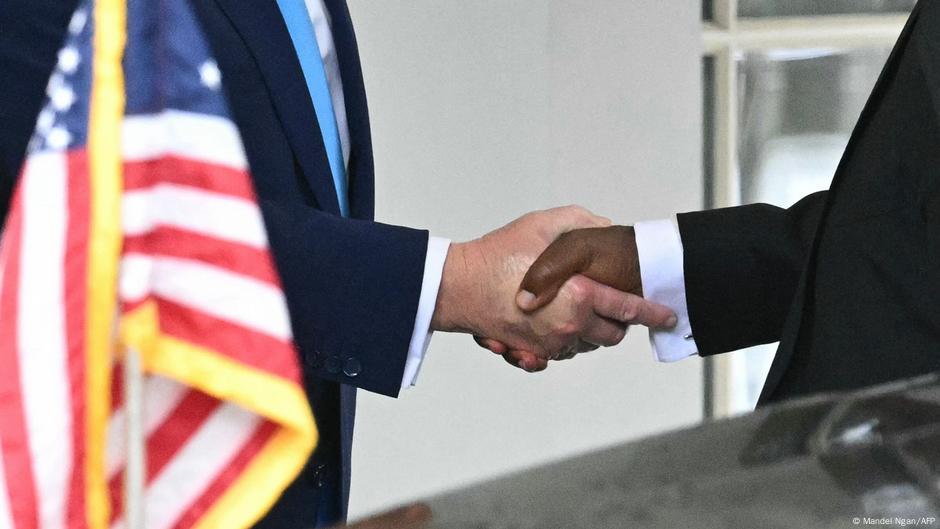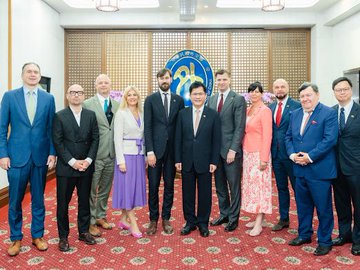In a surprising turn of events, the news of President Trump’s meetings with five African presidents this week has sparked a mix of curiosity, skepticism, and concern among both citizens and leaders across the continent. This unexpected development comes against the backdrop of Trump’s controversial past remarks about Africa, where he infamously referred to certain nations as “shithole countries” during a White House meeting back in January 2018. The stark contrast between his previous statements and the current engagement with African leaders has left many wondering about the underlying motives and implications of these high-level discussions.
The history of Trump’s interactions with Africa has been tumultuous, to say the least. His earlier comments, which were widely condemned as derogatory and offensive, created a rift between the US and several African nations. The perception of the continent being dismissed and disrespected by one of the most powerful leaders in the world did not sit well with many Africans, leading to a strained relationship between the US administration and various African governments.
However, despite the initial discord, Trump’s recent overtures towards Africa have raised eyebrows and prompted a reevaluation of his approach to the continent. The decision to invite five African presidents for discussions signifies a shift in strategy, hinting at a potential recalibration of US-Africa relations under the current administration. While some view this as a positive step towards dialogue and cooperation, others remain cautious, wary of hidden agendas and political posturing.
It’s like a rollercoaster ride with Trump and Africa – one moment he’s disparaging, the next he’s extending an olive branch. It’s hard to keep up with the unpredictability.
The acceptance of the invitation by Senegal’s President Faye has stirred mixed reactions within the African community. Some see it as a diplomatic gesture aimed at fostering better ties with the US and exploring opportunities for collaboration on various fronts. Others, however, express disappointment and concern, viewing the meeting as a form of capitulation to external pressure and a compromise of sovereignty.
The decision to engage with Trump is not just about diplomatic niceties; it’s a strategic move with potential repercussions for the entire continent. African leaders must tread carefully and prioritize their nations’ interests above all else.
The dynamics of US-Africa relations have broader implications that extend beyond the diplomatic realm. The outcome of these meetings could have far-reaching effects on trade agreements, security cooperation, development initiatives, and regional stability. As such, the stakes are high, and the decisions made during these discussions will shape the future trajectory of US-Africa engagements for years to come.
Understanding the motives behind Trump’s sudden interest in Africa is crucial for assessing the true intentions behind these meetings. Is it genuine engagement or a strategic maneuver to advance specific agendas?
In a rapidly evolving global landscape, where geopolitical dynamics are constantly shifting, Africa finds itself at a crossroads, navigating complex relationships with both traditional allies and emerging powers. The continent’s leaders face the delicate task of balancing national interests, regional alliances, and global partnerships while safeguarding their countries’ sovereignty and autonomy.
As the world watches with bated breath, the outcomes of Trump’s meetings with African presidents will not only shape the immediate future of US-Africa relations but also serve as a litmus test for the resilience and adaptability of African nations in the face of external pressures and challenges. The lessons learned from these engagements will undoubtedly inform policy decisions, diplomatic strategies, and international engagements in the years ahead.
In conclusion, the unfolding narrative of Trump’s interactions with Africa underscores the complexities and nuances of international diplomacy, highlighting the delicate dance between power dynamics, mutual interests, and diplomatic protocols. While the meetings with African leaders hold the promise of constructive dialogue and collaboration, they also raise questions about sincerity, trust, and respect in intercontinental relations. As the world witnesses this diplomatic spectacle play out, one thing remains certain – the future of US-Africa relations hangs in the balance, teetering between uncertainty and opportunity.









Leave feedback about this